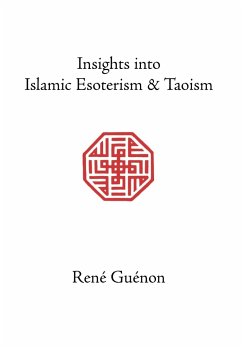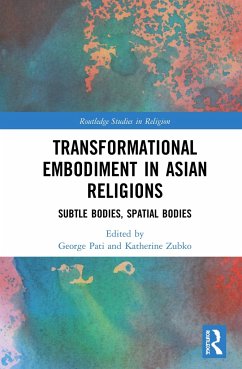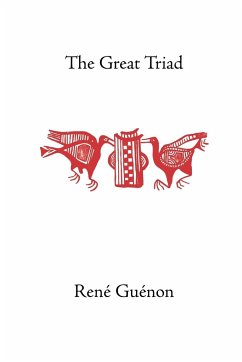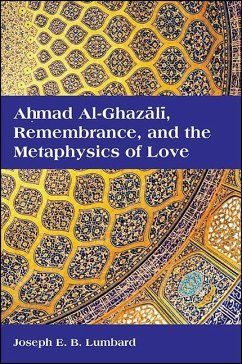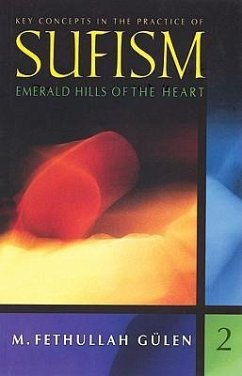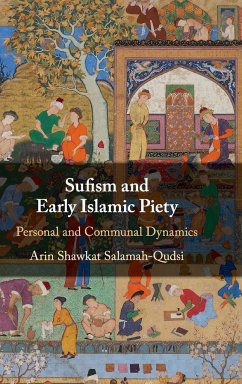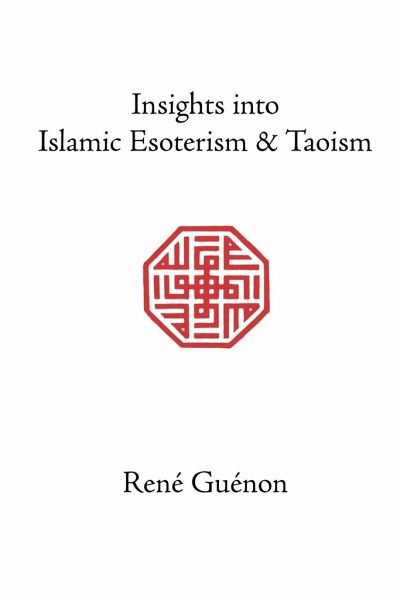
Insights Into Islamic Esoterism and Taoism
Versandkostenfrei!
Versandfertig in 1-2 Wochen
18,99 €
inkl. MwSt.
Weitere Ausgaben:

PAYBACK Punkte
9 °P sammeln!
René Guénon (1886-1951) is undoubtedly one of the luminaries of the twentieth century, whose critique of the modern world has stood fast against the shifting sands of recent philosophies. His oeuvre of 26 volumes is providential for the modern seeker: pointing ceaselessly to the perennial wisdom found in past cultures ranging from the Shamanistic to the Indian and Chinese, the Hellenic and Judaic, the Christian and Islamic, and including also Alchemy, Hermeticism, and other esoteric currents, at the same time it directs the reader to the deepest level of religious praxis, emphasizing the need for affiliation with a revealed tradition even while acknowledging the final identity of all spiritual paths as they approach the summit of spiritual realization. This small volume brings together a number of Guénon's early articles relating to Sufism (tasawwuf), or Islamic esoterism. The later article 'Islamic Esoterism' has also been included, since it so well articulates the particularities of initiation in Islam by defining the fundamental elements of tasawwuf: shari'ah, tariqah, haqiqah. The first constitutes the necessary fundamental exoteric basis; the second, the Way and its means; the third, the goal or final result. In the other chapters, Guénon expresses with his usual synthetic clarity what tawhid and faqr are, and gives examples of traditional sciences, relating angelology to the Arabic alphabet, and chirology to the science of letters ('ilm al-huruf). A number of book and article reviews give interesting insights into traditional orthodoxy. The Collected Works of René Guénon brings together the writings of one of the greatest prophets of our time, whose voice is even more important today than when he was alive. Huston Smith, author of The World's Religions, etc.
René Guénon (1886-1951) was one of the great luminaries of the twentieth century, whose critique of the modern world has stood fast against the shifting sands of intellectual fashion. His extensive writings, now finally available in English, are a providential treasure-trove for the modern seeker: while pointing ceaselessly to the perennial wisdom found in past cultures ranging from the Shamanistic to the Indian and Chinese, the Hellenic and Judaic, the Christian and Islamic, and including also Alchemy, Hermeticism, and other esoteric currents, they direct the reader also to the deepest level of religious praxis, emphasizing the need for affiliation with a revealed tradition even while acknowledging the final identity of all spiritual paths as they approach the summit of spiritual realization. This small volume brings together a number of Guénon's early articles relating to Sufism (tasawwuf)-or Islamic esoterism. A later, extended article with the same title has also been included, since it articulates so well the particularities of initiation in Islam by defining the fundamental elements of tasawwuf: shari'ah, tariqah, and haqiqah. The first constitutes the necessary fundamental exoteric basis; the second, the Way and its means; the third, the goal or final result. In the other chapters, Guénon expresses with his usual synthetic clarity what tawhid and faqr are, and gives examples of traditional sciences, relating angelology to the Arabic alphabet and chirology to the science of letters ('ilm al-huruf). A number of book and article reviews give further insights into Islamic cosmology. Some may feel that the essay "Taoism and Confucianism" here included has little relevance to Sufism and Islam. However, such writers as Toshihiko Izutsu and Sachiko Murata have drawn many parallels between the two traditions: Confucianism, concentrating on social and interpersonal norms, functions as a kind of shari'ah in the context of Chinese religion, while Taoism, like Sufism, is precisely the esoteric Way.



